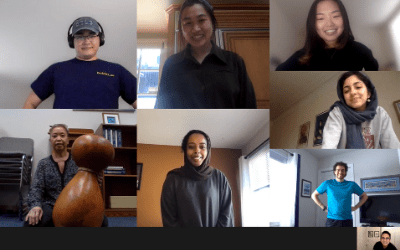
By Gwyneth K. Shaw
For years, a cadre of Berkeley Law students have spent their spring break doing pro bono work around the country, from the Deep South to Hawai’i. The pandemic shut down the 2020 expeditions, but this year’s crop was determined to make it work.
“It was incredibly important to me that this work still happen despite the pandemic,” says Amanda Rudat ’22, whose group partnered with the Appalachian Citizens’ Law Center in researching the current state of heirs property in Kentucky and potential reforms.
Part of the school’s Pro Bono Program, these Berkeley Law Alternative Service Trips — typically referred to as BLAST — partner students with grassroots legal advocacy organizations to give them a sense of what community lawyering is like as Students typically spend time on campus in the fall and early spring semesters preparing for their assignments, then dive in during a break from classes for what’s generally a 40-hour pro bono commitment.
This spring, BLAST students worked remotely with organizations in Tijuana, Hawai’i, Atlanta, Mississippi, and California’s Central Valley, as well as the Kentucky-focused team Rudat served with.
Heirs property, which is subject to a particular form of co-ownership, creates a major barrier to economic development, Rudat says. Its legal structure has been a leading cause of property dispossession among minority and low-income communities in the south, including rural Appalachia.
Rudat’s team also worked with the ACLC on a motion for black lung benefits. Other members of the Kentucky group helped AppalRed, a legal aid organization, with its divorce clinic.
For Rudat, who endured the cancellation of last year’s trip, the experience was fulfilling.
“The law school community is often very focused on a few large legal markets, which is understandable,” she says. “But being from the South, it’s important to me that Berkeley students have the opportunity to see and learn from the incredible legal advocacy being done in other regions of the country that they’ve probably never been to and probably won’t work in.
“I think this is an important learning experience that lets trip members build a deeper understanding of public interest lawyering and the different kinds of community challenges that lawyers can play a role in addressing.”
Widespread assistance
The legal topics for BLAST students spanned a wide range, from anti-trafficking, immigration, and domestic violence issues in Atlanta to elder law, housing, and Native Hawai’ian rights.
The Mississippi-focused group worked under the supervision of attorneys from the MacArthur Justice Center and the Mississippi Office of the State Public Defender to do a qualitative-based research project looking at pretrial detention practices in the state in the wake of recent reforms.
They designed a survey and completed 17 interviews with public defenders and justice, municipal, and circuit court judges across nine counties. Their report offers a snapshot of how the intended reforms are working, and what else needs to change to make the system better.
After a year of Zoom-based classes, students say it felt good to dig into the experience.
“I loved interacting with clients,” says Brooke D’Amore Bradley ’23, who worked with the Georgia Asylum and Immigration Network as part of the Atlanta-focused group. “It was refreshing after spending the majority of my 1L year in doctrinal classes that often feel removed from the actual human impact of the theory or doctrine.”
Andres Antuna ’23, who Zoomed from Anchorage, Alaska, to Hawai’i, worked with the Legal Aid Society of Hawai’i to review dozens of records in cases involving the state’s eviction moratorium and then brief attorneys about what he found.
“I am grateful I was able to use my legal research skills to positively impact an underserved community,” Antuna says.
Being remote was a challenge, Rudat says, although her group was able to work with ACLC at the beginning of August 2020 — which offered a model for how a full BLAST program could work.
“The obvious downside to being remote was not getting to see the communities we were working in. We weren’t in as constant contact with each other and our organizations as we would have been in person,” she says. “A positive, though, was being able to meet with people in different parts of the country. We were able to set up a meeting with the first BLAST Kentucky leaders, one of whom is in the Bay Area and the other in Kentucky, which probably wouldn’t have been possible if we were in person.”
Another student in the Kentucky group, Taliah Mirmalek ’23, says the readings and gatherings fall semester set the stage for an amazing experience.
“In a tight-knit group, we were able to address and face our own misconceptions of Kentucky and read authors who would address the different perspectives,” she says. “As a result, we had so much context going into the spring internship.”
Deborah Schlosberg, the director of Berkeley Law’s Pro Bono Program, credited this year’s BLAST participants with an extraordinary level of creativity and determination.
“They continued to provide pro bono support to communities outside of the Bay Area despite a public health pandemic and an inability to travel. They found ways to connect with each other and the communities they served despite their distance,” she says. “I am always inspired by the pro bono commitment our students demonstrate, but this year’s BLAST students truly exemplify the depth of that commitment.”